Game Plan Spread
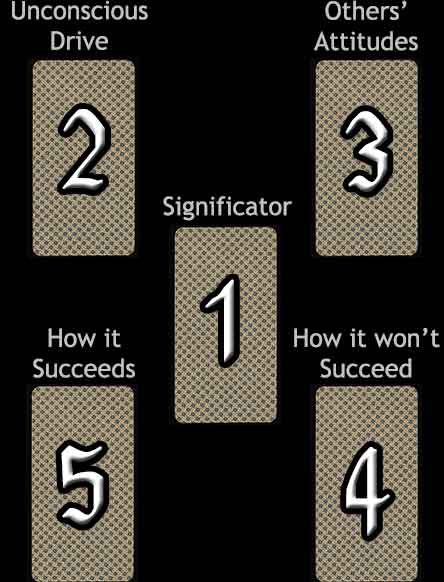
Difficulty: Easy
When a person has a certain plan in mind, this simple five-card spread presents a choice, hinting at what action or attitude should be taken for their plan to succeed, and what should be avoided to help the plan work out for the best.
The initial card is laid in the centre of the layout, the significator. The following four cards are laid out clockwise around the significator.
In this spread, the second card is about what drives the reader, but also says they are not fully conscious of this, perhaps even completely unaware of it. It provides a hint as to the reason they strive for their goal.
The third card uncovers what others think of the reader and their goals. The reader may or may not be aware of this. Sometimes other people factor into the plans (and sometimes they don't).
The fourth card suggests what not to do. If things are permitted to go down this path, the plan will collapse.
The fifth card is a hint as to how to make this plan work out favourably. The idea this card presents should be followed to make the plan successful. It is the differences between Cards #4 & #5 that should be noted, as the differences provide important clues.
Your Game Plan Reading
Unconscious Drive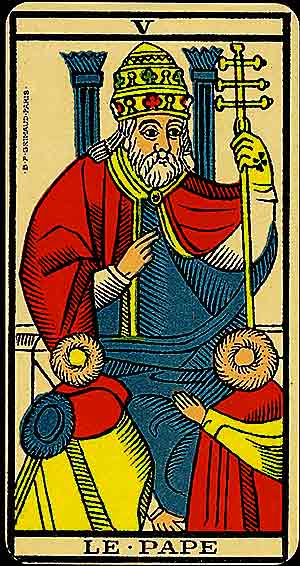 The Hierophant (Le Pape) |
External Influences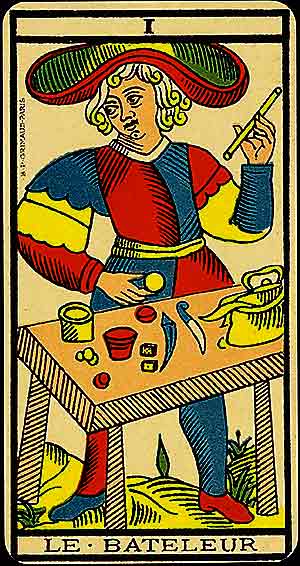 The Magician (Le Bateleur) |
|
Significator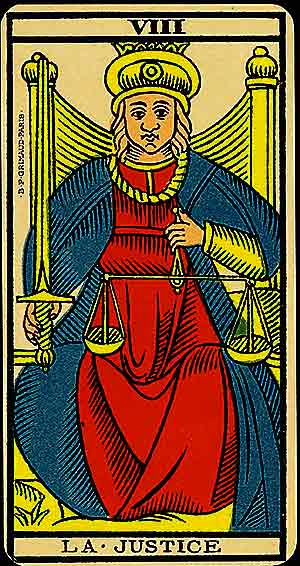 Justice (La Justice) |
||
How it Will Succeed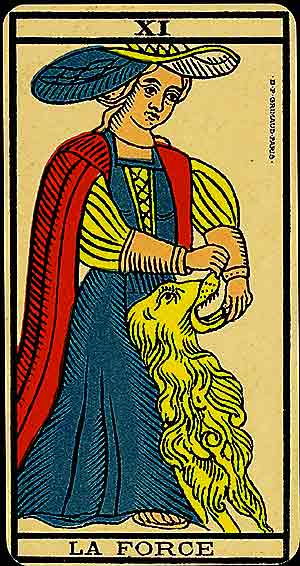 Strength (La Force) |
How it Will Not Succeed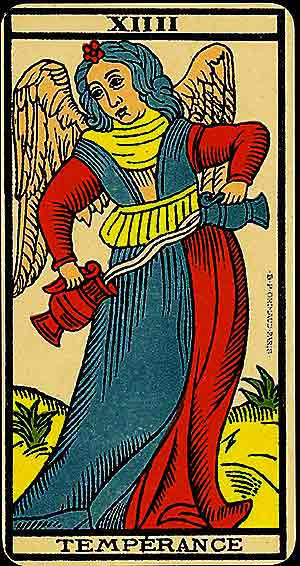 Temperance (Tempérance) |

Justice
(La Justice)
Symbolism:
Justice sits on a throne, holding a sword in one hand and scales in the other. The sword represents truth and decisiveness, while the scales signify balance and fairness. Her gaze is direct, indicating clarity and impartiality. The symmetrical composition of the card underscores equilibrium and order.
Meaning:
Justice represents truth, fairness, and the consequences of one's actions. It urges you to act with integrity and to weigh all factors before making decisions. This card often appears when a decision needs to be made or when karma is at play, reminding you that actions have lasting repercussions.
In relationships, Justice emphasises honesty and mutual respect. Spiritually, it calls for alignment between your actions and higher principles.
Keywords:
Truth, fairness, balance, integrity, accountability, karma, decisions, clarity, consequences, order.

The Hierophant
(Le Pape)
Symbolism:
The Hierophant sits between two pillars, with his hand raised in blessing and two followers kneeling before him. He holds a triple cross sceptre, symbolising his spiritual authority. The keys at his feet represent access to higher wisdom and the mysteries of life. His robe and crown emphasise tradition and institutional power.
Meaning:
The Hierophant symbolises tradition, guidance, and spiritual learning. He represents the wisdom passed down through teachings, rituals, and institutions. This card may indicate seeking guidance from a mentor, joining a community, or adhering to established norms. It also encourages you to examine your beliefs and values to ensure they align with your inner truth.
In relationships, the Hierophant suggests shared values and a strong moral foundation. Spiritually, he urges you to connect with divine teachings and the collective wisdom of humanity.
Keywords:
Tradition, guidance, spiritual learning, mentorship, wisdom, community, rituals, institutions, moral alignment, shared values.

The Magician
(Le Bateleur)
Symbolism:
The Magician is a youthful figure standing behind a table, holding a wand aloft while other tools lie before him—often a coin, a cup, and a sword. These tools represent mastery over the elements and the power to manifest intentions. His hat, shaped like a lemniscate, symbolises infinite potential, and his posture suggests readiness and action. The vibrant colours of his attire evoke creativity, energy, and a zest for life.
Meaning:
The Magician represents the power of initiative, skill, and resourcefulness. He embodies the ability to turn ideas into reality, combining intellect, action, and willpower. The card often signals the beginning of a new venture or opportunity, where focus and confidence are key. However, it also serves as a warning to avoid manipulation or overconfidence.
The Magician invites you to be aware of your tools and talents, urging you to act with intention. It also reminds you that success depends on your ability to harmonise thought and action.
Keywords:
Initiative, manifestation, skill, potential, confidence, willpower, beginnings, resourcefulness, action, focus.

Temperance
(Tempérance)
Symbolism:
An angelic figure pours water from one cup to another, symbolising balance and the harmonious blending of opposites. One leg is robed in blue, the other in red, reflecting equilibrium between the conscious and subconscious leading to spiritual enlightenment.
Meaning:
Temperance signifies balance, moderation, and the art of blending opposites to create harmony. It encourages patience, self-restraint, and the ability to adapt fluidly to life's changes. This card often appears when you are finding equilibrium in a challenging situation or working toward a greater sense of peace.
In relationships, it suggests compromise and mutual understanding. Spiritually, Temperance represents alignment with your higher self and a focus on unity and integration.
Keywords:
Balance, harmony, moderation, patience, adaptation, unity, self-restraint, healing, integration, peace.

Strength
(La Force)
Symbolism:
A serene figure, often a woman, gently tames a lion by holding its jaws open. Her calm demeanour contrasts with the lion's ferocity, symbolising mastery of inner strength. Above her head, the infinity symbol signifies limitless power and spiritual resilience. The image evokes vitality and harmony with nature.
Meaning:
Strength represents courage, compassion, and the balance between force and gentleness. This card embodies inner fortitude, suggesting that true power comes from patience, understanding, and self-discipline rather than brute force. It often appears in situations requiring emotional resilience or the taming of one's impulses.
In relationships, it signifies the power of kindness and understanding. Spiritually, Strength encourages connecting with your inner courage and finding peace amidst challenges.
Keywords:
Inner strength, courage, patience, compassion, resilience, self-discipline, confidence, harmony, emotional balance, fortitude.
